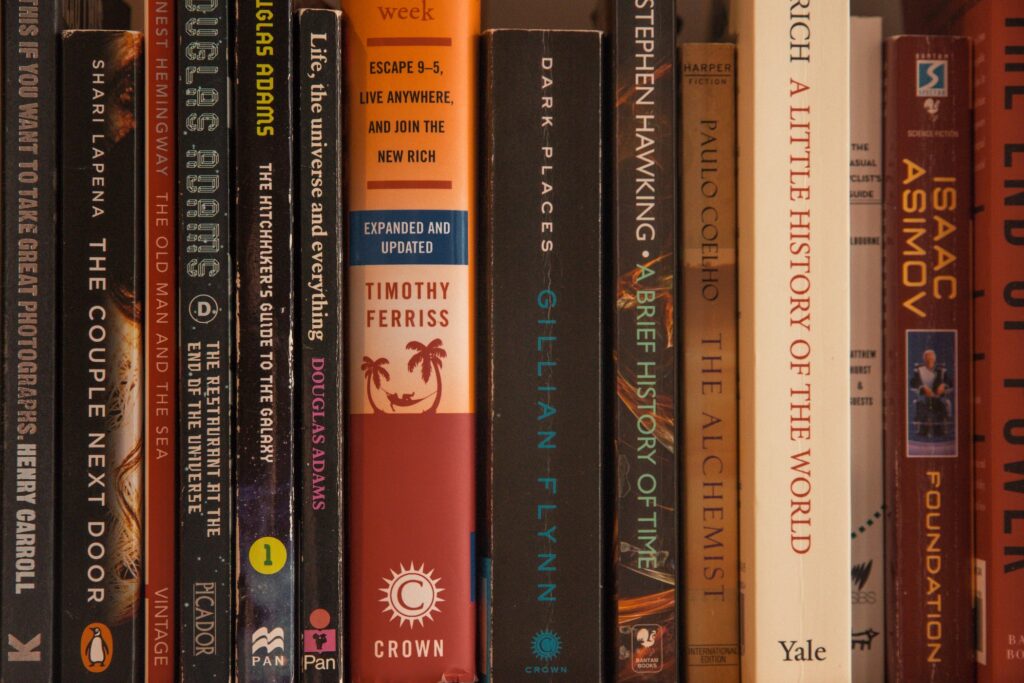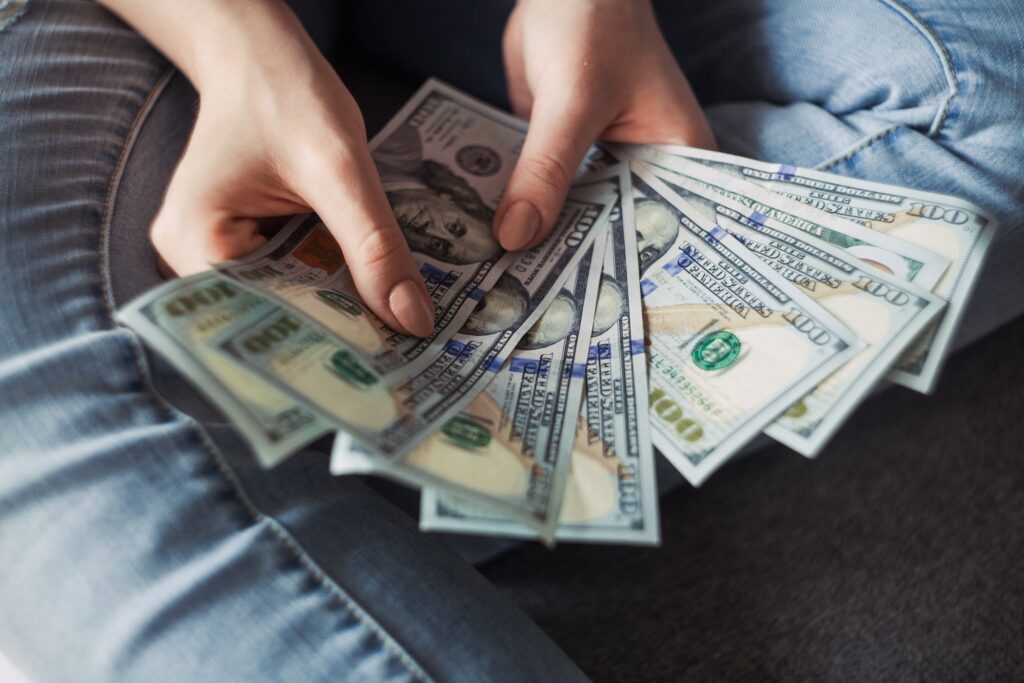Self-publishing is a rapidly expanding business. Authors have discovered a way out of the suffocating, predatory conventional publishing establishment, and they are reclaiming control of their own careers and creativity. While the creative flexibility, rapid turnaround, and higher royalty rates all seem appealing, how much money can you really earn by self-publishing your books?
Amazon is a big outlet for independent authors. Amazon, as a tool, may be difficult to understand and master. However, with little study and a solid approach, a self-published author might earn $10,000 or more per month by publishing their own books on Amazon.
If you’re thinking about self-publishing on Amazon, you’re undoubtedly wondering, “How much money can I truly earn as a self-published author on Amazon?”
What a great question! And kudos to you for doing your homework before jumping in with both feet. It’s a tough subject, and the answer certainly varies widely from author to author, genre to genre, and approach to plan. Let’s have a discussion about it.

average income for self published authors.
The average earnings of self-published writers on Amazon vary substantially from one another. Format, sales, and decisions made while preparing your book for publication may all affect how much money you receive.
Amazon’s royalty rates
Amazon’s royalty fee varies depending on your format and a few other things. eBooks and paperbacks, for example, have different prices.
On Amazon, there are two royalty rate choices for eBooks. The first is 35%, while the second is 70%. What would compel an author to pick a royalty rate of half? Not every title will be eligible for the increased royalty rate. According to the KDP website, the following requirements must be met in order to get the 70% royalty rate:
The list price must meet the minimum pricing standards. The current USD minimum threshold for a 70% royalty rate is $2.99. Any price less than that will be discounted by 35%.
The list price must be at least 20% less than the Amazon price for the physical book. This implies that if you sell your eBook and physical books at the same price, you will not be eligible for the 70% royalty rate.
The eBook must be accessible anywhere the author or publisher holds rights in the globe. That implies you won’t be able to get the 70 percent royalty rate if you restrict the availability of your book.
The 70% rate is also only accessible in specific areas.
What are your objectives?
Depending on your objectives for your book, you may choose the 35% rate. For example, suppose you wish to provide a 99-cent eBook as a sales funnel for your company. However, if your objective is to earn as much money as possible, you’ll probably want to tailor the manner you publish to meet the criteria for the 70% royalty rate.
Paperback royalty fees varied somewhat. KDP gives a 60% royalty rate via Amazon distribution channels. When consumers allow wider distribution, the rate falls to 40%. Paperback royalties are computed using the following formula, according to the KDP website:
Royalty payout = (royalty rate x list price) – printing expenses
So, if your book is advertised for $16, your printing expenses are $5, and you sell via Amazon distribution channels, you would compute the royalties you earn on each book as follows:
$7.60 = (.60 x $16) – $2
That works out to $7.60 every book sold! Isn’t it not a pretty picture?

How many books have been sold?
Assume we’re earning $7.60 each book. Only the quantity of books sold will tell us our income as a self-published author on Amazon. You can’t know how many books you’ll sell until you try, but you can get an idea from other authors’ sales on Amazon.
All you need is the Best Sellers Rank (BSR) of the book and a calculator.
The number of books on hand
The amount of books accessible is another aspect that will influence what an author creates. Having books in all forms (paperback, hardcover, and audiobook) will increase sales, but having more books published will also increase sales. For various reasons, the more often you publish books, the more money you’ll make:
- The Amazon algorithm prefers more consistently productive accounts, which implies that the more often you drop books, the more likely Amazon is to recommend your works to new readers.
- Having more books makes you more visible–there are simply more things for readers to come across and Amazon to recommend to them.
A reader is more inclined to seek out more of your work if they like one of your novels. They won’t be able to purchase another if you don’t have another for them to buy.
Because of those three criteria, you’ll undoubtedly want to publish more books in order to earn more money, particularly if those novels are part of a series.
How to determine royalties for writers who self-publish
Formats are available.
As previously stated, various formats have varied royalty rates. Paperback, hardcover, digital, and audiobooks will all have distinct pricing, sales statistics, and royalty rates. This will be true even if you self-publish outside of Amazon in most circumstances. Because of the cheap cost of manufacturing, eBooks enjoy the highest royalty rates. Hardcovers normally sell for more money, but they also cost more to produce. Which format makes you the most money will be heavily influenced by your pricing arrangements.
Venue for publication
Your royalties rate will be affected by where you publish your books. We’ve previously addressed Amazon’s, but there are other options for self-publishing than Amazon. For example, the current royalty rate per eBook sold through IngramSparks is 40%. If you satisfy the criteria for Amazon’s 70% royalty rate, you’ll earn more money publishing via KDP. If you don’t meet them, IngramSpark will pay you extra. To earn the maximum money, be selective about where you publish your books.

How to Make More Money on Amazon as a Self-Published Author
You may increase your earnings as an Amazon self-published author by carefully publishing and promoting your works. Here are five ideas for increasing book sales on Amazon.
1. keep writing and publishing your books.
Not only do more books enhance your earnings because more goods are sold, but the Amazon algorithm rewards accounts who publish often, putting your books in front of more customers in recommended areas.
2. Make your book available in a variety of formats.
Even if you just have one book, selling it in numerous forms allows you to sell additional “products.” Hardcover, paperback, and audiobook. You might also reissue your works in alternative forms, such as series collection volumes, companion novels, or new editions with new covers.
3. Create a sequence of stories. Compose a book series
Creating a series might be more profitable than creating a solitary work. If you publish a great first book, you may have repeat customers who buy later editions in the series. As readers spend more time with the story and characters, they are more likely to get hooked on a series. Enriching the series’ sales and the audience may result from additional friends contributing fan art, purchasing merchandise, and preordering future volumes.
4. Increase the number of people who read your works.
You should have a plan for improving readthrough on your books if you want to earn more money. The term “readthrough” refers to how often people purchase more of your publications–particularly additional novels in a series. There are a number of methods for boosting readthrough, such as:
- arranging your ends such that your reader wants to read more
- Instead of releasing your books one at a time, consider publishing them as a whole box set.
- establishing early pre-orders so that your fans can commit to reading more even if your publication schedule is slower
- encouraging your followers to follow you on Amazon and other media so they can keep connected and up to date on your latest releases
- Increasing the readthrough for your series, regardless of method, will increase revenues.
5. Don’t stop with your marketing efforts. Keep Going!
Obviously, effectively promoting your books will result in increased earnings. This might imply engaging in Amazon’s advertising programs or employing your author platform to increase sales. Among the strategies are:
- Organizing book signings and other activities
- Sales and discounts are available for a limited time only.
- Making bookiversaries and other key milestones a memorable event
- Social media marketing, such as the one seen below
Here’s an example of an Instagram challenge I ran to increase pre-orders for my novel, Starlight. It included story samples and writing prompts to inspire my readers to write their own short stories. So, not only did this put my book in front of everyone’s followers, but it also got those potential readers involved in the book itself.
The promotion for your book does not cease with the release. Try to plan how you’ll advertise your books for years after they’re published in order to maintain steady sales and enhance your revenue with each publishing.

As long as you don’t mind a bit of work, you can self-publish your books!
There is a broad variety of income amounts among self-published writers. Do your homework, monitor your statistics, don’t be afraid to experiment with new techniques, and don’t give up if you want to earn a career by self-publishing your books on Amazon.
When it comes to making money, self-publishing is to your benefit, even if we don’t have the evidence to back it up. Again, as a self-published author, you may make up to 70% royalties on each book, but conventional publishing earnings are limited to 25%. And you may self-publish (and profit from) numerous books in a year, while a large publisher would wait at least a year, if not more, between volumes.
Having said that, you may still be undecided on which publishing path to choose. Perhaps you feel that small press or Big 5 publishing is more feasible for you based on a variety of other reasons, such as mainstream marketability, a personal link in the business, and so on. Do you want to be certain? Take the above quiz!
What it takes to earn money as a published author
In this post, we’ve discussed royalties, advances, and annual author earnings, all of which are based on some of the most extensive statistics available. However, although these data are essential for understanding the sector, they should not be the focus of your attention; as Teddy Roosevelt famously remarked, “comparison is the thief of pleasure.”
Instead, concentrate on writing the greatest, most reader-friendly book you can – your efforts will pay off in the long run. On that point, here are five practical suggestions to help you earn more money as an author.
Write for both the market and your audience
Writing for the market is the first (and, probably, most essential) thing you can do to increase book sales. You may begin by selecting your target audience; the linked piece will teach you how to develop a proto-persona, or theoretical “perfect reader,” for your book, and then extend from there to determine who else you should target.
After you’ve identified your target audience, do more research to establish their current preferences!
Here are some suggestions to help you:
Read top-rated reviews of your competition titles on Goodreads (books that are similar to yours). What did readers think of these titles and why? The more people who agree on a certain issue — for example, “I adored the morally gray main character!” or “I despised the twist ending!” — the more likely it is that you should follow it in your own work.
1. To see what’s trending, try searching for relevant terms on Twitter and Instagram.
Social media posts, like Goodreads reviews, will tell you what readers really think — not to mention the insight you can gain from other people’s comments and replies.Look at what agencies are looking for in terms of manuscripts. You may find literary agents in your subgenre or category by looking at who represents your favorite writers – or by searching our literary agents directory! Then just review their agency profiles and Manuscript Wish Lists. Most are quite detailed and provide a cutting-edge look at what’s hot.
Keep notice of popular features that you may like to add in your future book as you investigate. Finally, pay attention to who is talking about books similar to yours! You may discover that your target audience is somewhat different than you thought and that you need to revise your proto-persona.
2. Spend money for quality editing and cover design.
The highest-paid writers in publishing, without exception, collaborate with both professional editors and cover designers. The latter is extremely important: according to our book cover marketing research, professionally created covers get up to 50% more clicks than non-professional covers.
3. Provide similar services
Other than book sales, the significance of revenue streams other than book sales cannot be overstated for a comprehensive strategy to author profits! If you want to augment your author income, you might attempt the following:
Coaching or consulting (if you write nonfiction).
Many accomplished writers provide coaching services to budding authors, supporting them with things like project planning, writing critique, and navigating the perplexing world of publication.
In addition, if you’ve authored a book on a nonfiction topic, you may make money by consulting on it. Publishing a book (or numerous books) in your industry has already established you as an authority; it’s only natural to capitalize on that standing by offering consulting services.
Courses and seminars are available.
However, if you’re looking for one-on-one training and counseling, it could be best to conduct courses and seminars that can be attended by numerous individuals at once. You’d create more in-depth, broadly applicable material on a subject of your choosing — for example, “How to Write Sparkling Dialogue” or “How to Turn Your Blog Into a Book” — and promote it to other authors, either via a multi-part course or an interactive presentation.
Services like as ghostwriting and/or editing are available.
Perhaps you’d want to avoid teaching entirely and instead perform other people’s job for them. If you have the talents, ghostwriting and editing may be quite profitable — but getting through jobs can be fairly time-consuming, so plan on committing at least several hours per week if you go this path.

What are the most profitable genres for authors?
Because of the demand for such publications, authors in particular book genres have been proven to be more successful than their colleagues in other genres. As a result, there will be increased rivalry in these higher-grossing genres. It is important for a new writer to concentrate not just on creating books in the highest-grossing genres, but also on where their abilities lay the greatest. In any case, here is a list of the most lucrative literary genres.
The Top Genres
- Erotica and Romance
With the success of authors such as Danielle Steel, who has sold over 800 million copies of her books to become the best-selling romance author in the world, and books such as Bared to You, Claimed, A Heart of Blood and Ashes, and the Fifty Shades of Grey trilogy, it should come as no surprise that this genre generates significant revenue.
- Mysteries and Crime
A excellent mystery novel is timeless. Take, for example, Agatha Christie’s And Then There Were None (1939), one of the best-selling novels of all time. James Patterson is now the best-selling novelist in the mystery and crime category, with over $700 million in sales over the previous decade.
- Motivating (Religious & Self-Help Books)
This category of books is estimated to be worth $11 billion every year, with book sales accounting for $720 million of that total. Memoirs are often the best-selling novels in this genre.
- Science Fiction and Fantasy
Fantasy and science fiction novels account for a significant portion of the list of all-time best-sellers. If you want to see how popular authors in this genre are, look no further than J.K Rowlings’ Harry Potter series of novels.
- Young Adults and Children (Picture books)
It takes expertise to develop a novel that appeals to a younger reader. However, if one is successful, there are many parents who are eager to purchase books for their children.
Amazon Self-Publishing Product Promotion
One important step in selling your book is to design an eye-catching page for your Amazon self-publishing listing. More casual book surfers will be “converted” into consumers by a lengthy description. Furthermore, if you include keywords relating to your subject, anyone searching Amazon or Google will find your book towards the top of the results. When deciding on a title for your book, keywords come into play as well. On Amazon, most people write pretty short descriptions, but you have plenty of room to create a really lengthy thorough description that will truly convince readers on the merits of your book and why they should purchase it.
Reviews are essential to selling more books
Reviews might also help you sell your book. People want to know what prior readers thought before making a purchase decision. So, where do you receive reviews as a new author? Send the book to persons in the business or specialists in the area discussed in the book, as well as coworkers, friends, and family… and then ask them to provide an honest evaluation. The trick here is to remain persistent in your efforts to get reviews. Most individuals are highly busy, and even writing a brief book review is unlikely to happen without a little prodding.
Make use of your favorite social media platforms
You should also spread the news on social media platforms such as Facebook and Twitter. Create a website. Make a mailing list. Join forums pertaining to your book’s theme and participate in the discussion… while discreetly mentioning your book. Comment on blogs in your field, directing readers to your book’s website or Amazon page.
Everything you need to know about self Publish here.
Advertise on Amazon
Another option is to use Amazon Advertising to run adverts. You can run advertising every time someone searches for a keyword on Amazon, as well as display adverts for your books when visitors look at other books connected to your book. This is one of the most cost-effective methods to perform sponsored promotion for a low-cost book while still making a profit.
There is a road to success for your author profession depending on your aspirations.
Writers may become published authors far more simply in today’s publishing market than they could in the past. Traditionally, conventional publishing controlled the book market, and writers needed to be approved by a traditional publishing firm before their work could be published.
Read more about the differences between traditional publishing and self-publishing.
The problem is that conventional publishing has always been very competitive, which means that many outstanding authors have been turned down.
With the growth of self-publishing services such as Amazon’s Kindle Direct Publishing, anybody may now publish a book. Some say that, of course, this opens the floodgates and lowers the quality of literature. However, many writers have achieved success by self-publishing high-quality books and have developed long-term creative companies.
Misunderstandings About Authors’ Salaries
It’s important to understand the typical misunderstandings about how much an author makes so that you can have a realistic vision when you begin your own writing career.
If your only goal in writing or publishing is to earn millions, you may be setting yourself up for failure. Instead, approach your author profession with a fervent desire to write and share your message with the world. The rest will fall into place with hard work and perseverance.
Aspects to consider while self-publishing a book include the following:
Typically, publishing a book will not result in instant success. It demands a well-thought-out book marketing strategy!
In most circumstances, writing a book will not make you wealthy. Most writers achieve financial success by creating numerous books or by leveraging a book to expand their company.
Writing and publishing are not a quick-money scam. Writing is difficult — just ask any writer! Publishing requires commitment. Publishing a book does not guarantee quick fame and fortune.
Many writers achieve success by turning their novel into a company. The bulk of writers who achieve substantial financial success from their book are those who start a company or produce many novels.
Your ambition should be driven by a desire to write and share your message. When you’re enthusiastic about your book’s message, it will power you through the tough and frustrating moments of your author career.
How much can an author earn in 2022?
It’s becoming easier than ever to self-publish your book. And more and more tools are becoming available to help authors find their audience. We can expect many more sufficient ways authors can earn with their works beyond 2022.
The entire amount of money earned by an author in any given year is referred to as his or her author pay. Both in this article and around the globe, the terms ‘income’ and’salary’ are often used interchangeably.
As self-employed professionals, writers’ earnings might fluctuate greatly from year to year due to the unpredictable nature of the book industry. A year in which an author produces two novels will almost always result in a larger revenue than a year in which they do not write any. That is why it is critical for writers to focus on finishing their projects and sharing them with the public on a regular basis.
This is true for writers who have self-published as well as those who have been formally published. A self-published author may have greater leeway in creating completion timeframes, but this also means they must hold themselves accountable to their creative and financial objectives.
Many authors, like many other professions, prefer to keep their financial details secret. However, several have recently began to post their salaries/income in order to provide those seeking to join their ranks with a true sense of the financial potential inside the industry.
Book Earnings vs. Salary
An author’s pay is the entire earnings in any given year, but book earnings are merely one component of an author’s overall compensation.
While building their reputation, an author may continue to work a day job or undertake freelance work to augment their income while building their platform. Many writers with committed followings, for example, have decided to join networks like Patreon, where their followers may directly pay them to continue publishing their work.
In certain cases, writers develop and publish books for the sole purpose of boosting their bigger brands. This is often the case for entrepreneurs who wish to convey a condensed version of their company concept. The enthusiasm sparked by the book may result in higher sales of a product, greater traffic to their website, or participation in specialized coaching sessions with the author.

